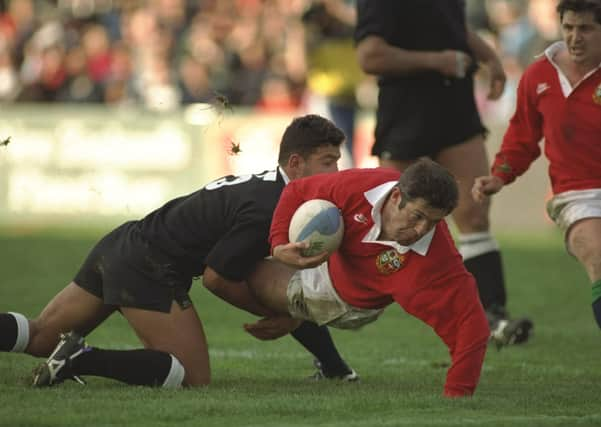Allan Massie: Scotland must improve away record in order to increase Lions representation


Vodafone, announcing its sponsorship of next summer’s Lions tour of South Africa, described the Lions as “the best example of unification we could find; it unifies the home nations, the whole of Ireland, and brings together family and friends. It spans the generations.”
Well, yes, I suppose it does, even though a fair number of Scots, resenting Scotland’s poor representation in the last two or three Lions parties, have taken to supporting the opposition in Lions’ Tests, rather as, in the days of Apartheid, Black South Africans hoped the Lions would eat up the Springboks.
Advertisement
Hide AdAdvertisement
Hide AdI’ve long thought that in purely rugby terms the Lions belong to the past, even to the old amateur days. The idea that four countries have to pool their resources to beat one is absurd, even speaks – certainly used to speak – of an inferiority complex. In commercial terms, it’s very different. Commercially the Lions are a good thing, and next summer’s visit to South Africa is a very good thing for the host country, not only because South Africa are the World Champions, but also because of the sad state of the South African economy and its currency.
It’s a pity of course that this autumn’s internationals and the Six Nations in the spring will be treated by some in the media as if they were Trial matches for the Lions’ squad. But there’s nothing one can do about that, except to remark that the insistence on looking ahead, whether to the Lions or the next World Cup, tends to devalue the importance of each single international match.
Looking back, I don’t know how many living Scottish Lions there are. You might struggle to put together a XV from the professional era, certainly a XV of players who have started a Lions Test, even if you stretched your criteria to include players such as Stuart Hogg and Simon Taylor who would surely have been in the Lions Test XV, but for being injured earlier in the tour. Hogg would have followed Ken Scotland, Stewart Wilson, Andy Irvine and Gavin Hastings as a Lions full-back – and may of course yet do so next summer – while Taylor, before injuries took their toll, was the outstanding No 8 in the four Lions countries. Likewise Doddie Weir would surely have partnered Martin Johnson at lock in South Africa in 1997 but for the horrible injury inflicted on him in a provincial match, an injury which ended his tour before the First Test was played. Had he done so there would have been four Scots in the Test XV, the others being Gregor Townsend, Alan Tait and Tom Smith. We’ve had no such representation since.
Cynics might say that this is because there has been no Scottish head coach, hence selector, since Iain McGeechan in 1997. A Lions coach who is also coach of a national team is always likely to choose players he already knows well and trusts. Some of us have thought Warren Gatland, who has already been head oach three times and will be that again next summer, is prejudiced against Scots, but the truth is that Scotland’s poor record over the last 20 years is the main reason for our miserably low representation. This isn’t likely to change until we start winning matches away from Murrayfield.
Meanwhile we are within sight of an oasis after our long trek across this summer’s desert. Last season’s Six Nations will be completed with Scotland playing Wales, destination yet unknown since the Principality stadium has been turned into an auxiliary hospital. There is talk of Twickenham or Wembley, but since we don’t yet know whether or when spectators will be permitted, or in what sort of numbers if they are, it might be as sensible to play the match at a Welsh club ground – even the old Arms Park in Cardiff. Having a crowd – even a half or third of a crowd, all observing social distancing requirements is of course desirable, but English Premiership and FA Cup football and the cricket Test series between England and the West Indies have both shown that good quality and even gripping sport isn’t dependent on the presence of a crowd. Jock Stein may have had a point when he said that “football without fans is nothing”, but the evidence of the last few weeks suggests that it’s a good deal better than nothing.
Of course there may be the dreaded second wave of Covid-19 and if so the best-laid plans of mice and men and World Rugby may indeed go all agley, but one guesses that outbreaks may be sporadic and localised, and we will not have a blanket lockdown imposed on us again. So at least cautious optimism is possible.
A message from the Editor:
Thank you for reading this story on our website. While I have your attention, I also have an important request to make of you.
With the coronavirus lockdown having a major impact on many of our advertisers - and consequently the revenue we receive - we are more reliant than ever on you taking out a digital subscription.
Advertisement
Hide AdAdvertisement
Hide AdSubscribe to scotsman.com and enjoy unlimited access to Scottish news and information online and on our app. With a digital subscription, you can read more than 5 articles, see fewer ads, enjoy faster load times, and get access to exclusive newsletters and content. Visit https://www.scotsman.com/subscriptions now to sign up.
Our journalism costs money and we rely on advertising, print and digital revenues to help to support them. By supporting us, we are able to support you in providing trusted, fact-checked content for this website.
Joy Yates
Editorial Director
Comments
Want to join the conversation? Please or to comment on this article.